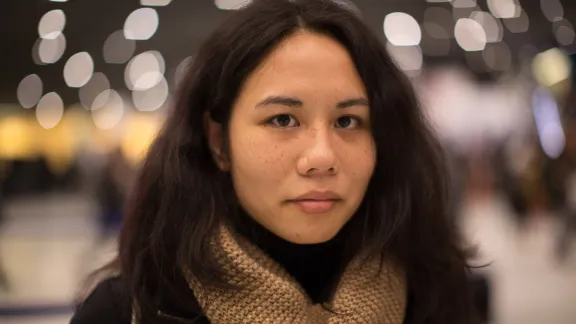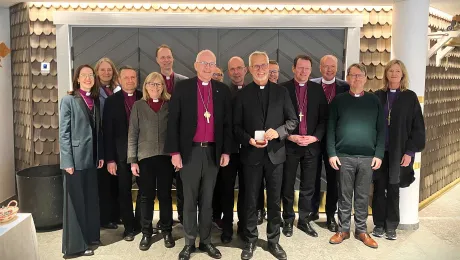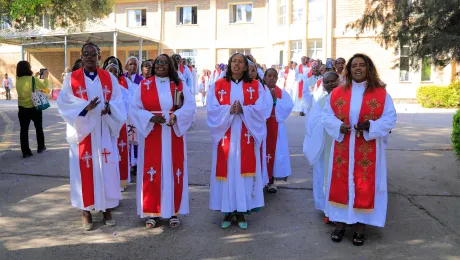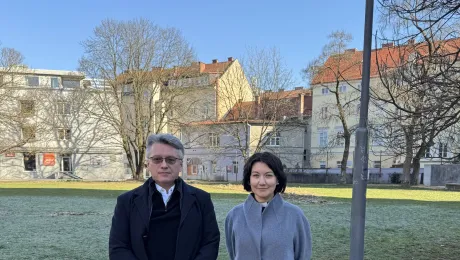
Ms Gloria Samosir during a side event at COP 24 in Katowice, Poland. Photo: LWF/Sean Hawkey
The idea of “climate change” rings ‘commonsensically’ familiar to subsistence farmers on Samosir Island of Lake Toba in Indonesia’s North Sumatra province. The expression conveying climate change in the local language of Toba Batak—“tingki na maruba”—literally translates to both “the times have changed” and “the seasons have changed.”
Indeed they have, the farmers will tell you. From the vantage point of a hill on Samosir, the impact of the “changing times” is unmistakable. The cracked soil beneath the rice sprigs; the shriveled, fruitless bushes; the shrinking depth of a smaller lake on the hill (adding another layer to the geological idiosyncrasy of the place—a lake on an island inside a lake inside an island), all speak to a state of affairs within which it has become increasingly difficult to thrive as a smallholder farmer. The young farmers will tell you that they often run away from visitors when they see them: not to be rude, but because they are in fact deeply ashamed of having neglected to shower for days on end, due to lack of access to water.
These extended periods of drought, leading to frequent crop failure, aren’t the only symptoms of an island that is sick through and through. Every couple of years, the (farmed) fish die en masse, abruptly. Every other day, trees catch fire. For spectators sailing on a ferry to the island for the first time—perhaps having been enticed by ongoing government initiatives to promote Lake Toba as a premier tourist destination—the natural beauty will likely be striking. The island on the lake in the island, in all of its turquoise and cerulean, rolling-hilled glory, makes for an idyllic impression from a distance. But pay attention up close; note the rib cages on the roaming cows. The bald patches on the hill tops, amidst what might have been lush, dense forest. The oxygen levels of the waters.
Making climate action relatable to so-called ordinary members of society and their daily lives has been noted as a requisite for moving toward a more sustainable future. On the other hand, many have remarked that non-governmental groups, including ordinary citizens, are often “ahead” of official policy makers with regard to their understanding of climate issues. The farmers of Samosir Island are not likely to be privy to the high level discussions that are going on at this (or any) year’s UN climate change convention, but ordinary as they might be, they are extraordinarily attuned to the fact that something has changed in the climate, the times, and the seasons; and something is very, very wrong.
Biographical info
Gloria Samosir comes from Indonesia, and she is studying environmental history. She is a member of the Protestant Christian Batak Church (HKBP), and was part of the LWF delegation at COP 24 in Katowice, Poland.
From Our Blog
COP24
A delegation of young people from the member churches has been representing the LWF at the annual conference of the United Nations Framework Convention on Climate Change since COP 17 in Durban, South Africa. At COP 24, the seven delegates from each of the seven LWF regions, come with different experiences and expertise in climate action, climate advocacy and theology of creation.


